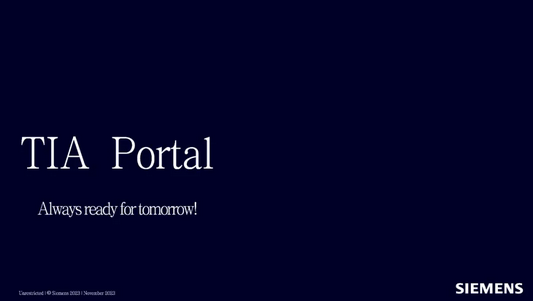- Get link
- X
- Other Apps
Siemens unveiled its groundbreaking Industrial Copilot, the first AI product for industrial engineering design, at the Hannover Messe on April 23, 2024.
This innovative product seamlessly integrates with TIA Portal software, marking a new chapter in intelligent industry. This automation solution not only significantly reduces the time required for automated code generation but also enhances engineering design efficiency and precision through automated virtual tasks and PLC code construction.
This milestone signifies the dawn of intelligent industrial engineering design, as the industry steps into a new era of automation and AI integration.
 |
| Siemens AI (photo:Siemens) |
In 2023, Siemens and Microsoft jointly envisioned the future of generative AI assistants by integrating automation and process simulation information from Xcelerator into the Industrial Copilot. Leveraging advanced large language models from Microsoft Azure OpenAI services, the Industrial Copilot further enriches its capabilities, such as enhancing code creation and optimization in factory automation software.
This cross-platform collaboration has propelled Siemens Industrial Copilot to new heights in functionality and practicality. At the 2023 SPS (Germany's Nuremberg International Trade Fair for Industrial Automation and Components), Siemens partnered with Schaeffler to showcase the first enhanced production equipment utilizing generative AI technology. At the 2024 Hannover Messe, Siemens officially launched the first generative AI product tailored for engineering applications, marking the transition of this technology from the theoretical phase to practical scalability.
Industrial automation solution provider Grenzebach Group has actively embraced Siemens Industrial Copilot. Dr. Steven Althaus, CEO of the group, stated, "Generative artificial intelligence has become a crucial factor in enterprise competitiveness." Through collaboration with Siemens, Grenzebach Group is able to fully utilize data resources from industrial sites, enhance human-machine collaboration, effectively address shortages in technical talent, accelerate the pace of technological innovation, and significantly improve production efficiency.
 |
| Siemens TIA (photo:Siemens) |
Integrated with TIA Portal, Strengthening Engineering Design Capability:
Industrial Copilot is specifically optimized for engineering design within TIA Portal, enabling the automatic generation of code using Structured Control Language (SCL), eliminating tedious manual copy-and-paste steps. Furthermore, this AI assistant can interpret SCL code modules, guiding users to effortlessly establish virtual machines or factory models in the WinCC Unified environment. Engineers can greatly enhance their efficiency by searching the Siemens official manuals using natural language. To ensure data security, customers can opt for access to dedicated Azure OpenAI service instances, avoiding the retraining of models using client data.
Industrial Artificial Intelligence Leading Industrial Upgrades:
Siemens is introducing industrial-grade generative artificial intelligence into practical shop floor scenarios through Industrial Copilot, poised to become an indispensable component of engineering processes in the future. With seamless integration with TIA Portal, Siemens is at the forefront, offering generative artificial intelligence products tailored for engineering design to industrial enterprises globally.
Siemens plans to roll out a comprehensive series of generative artificial intelligence-driven industrial assistants across various segments of its business value chain, aimed at assisting enterprises in achieving comprehensive transformation and upgrades. Currently, Siemens is actively advancing the deployment of generative artificial intelligence assistant solutions in collaboration with several pilot customers and strategic partners in fields such as automotive manufacturing, infrastructure construction, transportation, medical equipment, general manufacturing, and mechanical engineering.
In summary, Siemens Industrial Copilot, tailored for diverse scenarios including design, planning, engineering, operations, and service, will further streamline human-machine interaction processes, making them faster and more efficient, thanks to its powerful functionality and user-friendly interface. The future of industrial automation will increasingly rely on these cutting-edge technologies, continually driving the intelligent upgrade of industries, and helping the global economy transition towards a more sustainable development model that is greener, smarter, and more efficient.
We PLC engineers might be feeling a bit concerned at this point, wondering if our jobs are at risk?
But personally, I don't think there's any need to panic. Instead of worrying, it's better to change our mindset.
With the rapid development of AI technology, the way engineers work is indeed going to change, and there might be a decrease in demand for certain traditional skills. However, this doesn't mean that engineers will be replaced. On the contrary, we need to adapt to these changes and focus our energy on more complex and innovative tasks. In the future, the role of engineers will be more about solving complex problems and fostering creative thinking, rather than just being task executors.
Engineers will still be indispensable in the future. After all, AI can't replace engineers who travel to solve on-site problems. While PLC programs can be written in the factory, engineers are needed to handle various issues on-site, such as equipment communication failures, mechanical problems, electrical distribution, and so on. These are problems that AI can't handle, so there's no need to worry too much. Let's continue to focus on our work.
What do you think?
- Get link
- X
- Other Apps